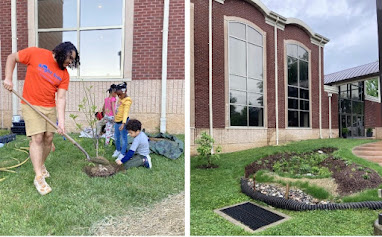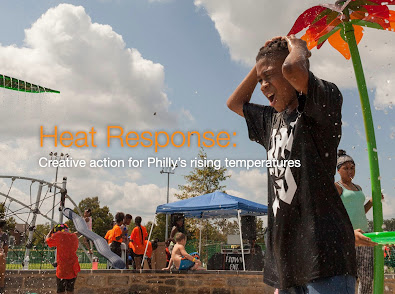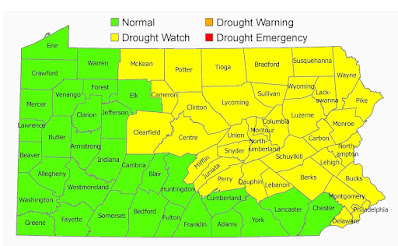Rain gardens are a crucial piece of green infrastructure that capture and filter stormwater before it enters local waterways. They are bowl-shaped and full of native grasses, perennials, and shrubs whose roots filter sediment and pollutants from runoff.
They also prevent flooding by storing water, reducing erosion from collecting sediment, and providing habitats for native animals!
Right here in Lancaster, at Brightside Baptist Church, there is a rain garden that contains native plants like milkweeds, switchgrass, sedges, turtleheads, soft rush, purple coneflowers, and blue cardinal flowers.
These plants are strategically placed at different elevations within the garden to filter varying amounts of rainwater as well as for aesthetic purposes.
For example, switchgrass and soft rush are placed higher along the edges of the rain garden, while milkweed and purple coneflowers are placed lower in the garden basin because they can handle more water.
The garden captures rainwater from 217 square feet of the roof and can store over 320 gallons of water.
Besides managing stormwater, these plants also attract and provide habitat for hummingbirds, Baltimore Checkerspot and Skipper Butterflies!
This garden was installed this past May through a collaborative effort from the Brightside Baptist Church’s Team 24, the Interfaith Partners for the Chesapeake, the Chesapeake Conservation Landscaping Council, and the Alliance for the Chesapeake Bay.
Earlier this year, Bright Side connected with Interfaith Partners through their Faithful Green Leaders Program, a training program IPC offers to congregations interested in forming a “green team.”
IPC is uniquely positioned to help lead communication around conservation to communities of faith and engaged in outreach to various congregations in the City of Lancaster early on.
The Alliance met with IPC and Bright Side last fall for a site assessment to evaluate the property for green infrastructure opportunities and suitable areas for a practice such as a rain garden.
In the spring, the Alliance also led the design effort and coordinated with a contractor for installation and church volunteers to plant the rain garden.
We also worked closely with IPC and Team 24 at BrightSide as the installation location and design were finalized and to plan a public showcase event held during Water Week in June.
On June 27th, the CCLC coordinated with Team 24 and the Alliance for a rain garden maintenance workshop.
At this workshop, volunteers learned how to identify native and invasive plants from their leaves using various identification tools and apps.
They also took soil samples from inside the rain garden and outside in the surrounding turf to compare the differences in soil composition and drainage capacity.
The soil outside of the rain garden consisted of mostly impervious clay and thus is not suitable for rain garden basins.
Inside the rain garden, the soil was mostly silt and sand, which gives the soil excellent drainage for storing and filtering stormwater.
The volunteers also drafted a maintenance plan for the rain garden at Brightside and for their personal use should they choose to construct a rain garden on their property.
Maintenance is critical for a rain garden to successfully reduce flooding and erosion because a rain garden can only be effective if we adjust to vegetation growth and climate change by making changes in the garden over time.
But we had such a good turnout for the maintenance training on Monday that I am confident that the rain garden at Brightside and elsewhere will be able to effectively function and work to improve the water quality of the Conestoga watershed and the Chesapeake Bay as a whole.
For our forests. For our streams. For our Future.
More information is available on programs, initiatives and special events on the Alliance for the Chesapeake Bay website. Click Here to sign up for regular updates from the Alliance, Like the Alliance on Facebook, Follow them on Twitter, and visit the Alliance’s YouTube Channel. Click Here to support the Alliance’s work.
Sean O’Connor is an Environmental Studies Major at Franklin & Marshall College.
(Reprinted from the Alliance for the Chesapeake Bay Blog.)
Related Article:
-- Lancaster Clean Water Partners Report On Progress, Local Projects To Improve Water Quality In Lancaster County
[Posted: September 1, 2022] PA Environment Digest





